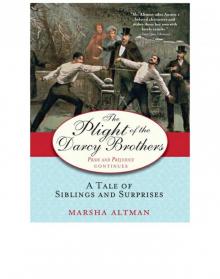- Home
- Marsha Altman
The Plight of the Darcy Brothers Page 3
The Plight of the Darcy Brothers Read online
Page 3
“So it was not,” Jane said, because Mary was having trouble. Anne and her husband had long since disappeared, and she helped her sister to the couch so she could settle, because Mary was trembling. “You have feelings for him?”
“I—I do not know. Yes, I suppose,” Mary said. “Giovanni's feelings for me may have been stronger. He was only there for a short while. He attends a school in his native country, but he was taken to Paris to be treated for his epilepsy, which was interfering with his studies. I am not a fool to go boundlessly declaring myself in love.”
So, Mary still had it in her to be dismissive of the expressions of others. It was almost a relief to see the old Mary, instead of the person before them, who was so remarkably different, so ashamed of her own feelings.
“But the situation is untenable. I cannot marry him. Papa would never approve, and Giovanni is promised to the church. His family expects nothing less of him than a red hat. They may already have promised him a bishopric, if he could only complete his studies and take Holy Orders.”
Admittedly, the idea of Mary living in Italy with this man— Giovanni—was not ideal to either sister present, and Mr. Bennet would not settle for anyone but a son-in-law from the British Isles, for any number of reasons. Jane and Elizabeth would likely not attend the wedding or see Mary again, unless their husbands decided to travel abroad and take them with them, and with one of them constantly with child or nursing, that was unlikely. So Mary was right that her situation was problematic. If Mary was truly in love, it was hard to tell, but she was right that she was not one to go bounding about and announcing it, so they could only guess how she truly felt about this man.
“Mary,” Jane said, with a hand on her shoulder. “Where is he now, this—”
“Giovanni. Mr. Mastai, if I am to be formal and English about it. He has gone back to school, with no intention to return to France.”
“So he rejected you?”
“No, hardly. But as I said—he is studying for the priesthood.”
Elizabeth sighed. Jane was quicker, not in wit but in finding something comforting to say. “Then there is nothing you can do. I know it seems impossible now, but surely some other man, who is English, will find the same qualities in you as Giovanni did. This man will find you so special that he will propose to you and you will be married, and this all forgotten.”
Mary responded by breaking into wracking sobs, and her sisters sat protectively on each side and rubbed her shoulders. “Mary—”
“No,” she said between sobs. “It is so much worse than that.”
“To be sorely in love—”
“Again, no, you are wrong,” Mary said. “That is not all. I am carrying his child.”
THE SAD TALE OF MARY BENNET
IT WAS A LONG time before anyone could say anything. Jane, ever trusting and ever thinking the very best of everyone's actions and intentions, finally blurted out, “You are sure?”
“Quite. So very sure.” Mary sniffled, trying to compose herself. “All of my supposed piety was for nothing, because I am nothing but a whore.”
“Mary!” Elizabeth said. “You are no such thing. You are an innocent, and he seduced you.”
“I will not lie to myself or anyone else. As… persuasive… as he may or may not have been, he did not force himself upon me, and had I known, I could have refused to see him except in public or refused outright the offer, as I should have done—”
“We can only think the best of our sister and the worst of him,” Jane said, some curtness in her voice, not necessarily directed at Mary. “Did you tell him?”
“Yes.”
“And he still left you?”
“What was he to do? Take me home as his bride? He offered some money, but I did not accept.”
“Then you are not a whore,” Elizabeth said. “You do not fit the definition. You were—are—an innocent girl, who was cruelly taken advantage of—”
“No! I will not absolve myself of my own failings or allow anyone else to do so!” Mary replied with surprising indignation. “The problem is mine. I called on you, Jane, because I had to see someone before I saw Papa. Surely now you understand, because he will cast me out—”
“He will not cast you out—”
“He cast Lydia out!”
“Lydia did not—,” but suddenly even Elizabeth found it very hard to argue that Lydia had done anything as scandalous as Mary, or at the very least, presented obvious evidence of it. Lydia quite publicly ran off with the charming young soldier Mr. Wickham, and he would never have married her and saved the family's reputation if Darcy had not forced the issue. Elizabeth set that aside and found her words. “Lydia did what she did wantonly—and made a fool of herself in the process. You are trying to do precisely the opposite.”
“You are being kind,” Mary said, “but I cannot right this wrong. Papa has every right to send me to a nunnery and put the baby on an orphanage doorstep!”
She leaned on Jane's shoulder, and her sister replied with urgency, “How far are you along?”
“Two months.”
“Are you sure?”
“Yes.”
The gravity of the situation—already in high evidence— came down like a weight upon them. “Two months?”
“I didn't know—how was I to know? And then we debated what to do about it, and we tried going to a doctor—”
“You didn't,” Elizabeth said, but was forced to imagine the desperation of her sister, all alone in France with a probably unhelpful companion. If Mary had found a doctor—could they really have ended the pregnancy? There was a question she would never ask Dr. Maddox.
“I did. I mean, the most horrible deed was already done, or so it seemed, and I could not wait out my term in France—not when I was expected home in the summer.” Mary was crying again. “Please tell me at least one of you will take me in when Papa refuses ever to see me again.”
“He will not,” Jane said. “He will be very cross at first, but he will recover, and we will sort this out.”
“But Jane,” Mary said, “there is nothing to sort!”
Unfortunately, no one could find a way to tell her she was wrong.
The Darcys had very good mattresses, properly lined with down and cotton. Unfortunately, the mattresses provided ample soft surfaces on which to bounce—something Darcy found his son quite ready to take advantage of. He rolled over, squinting in the (undoubtedly very) early morning light, as his eyes focused on the image of Geoffrey Darcy, still in his nightclothes, jumping up and down on Lizzy's side of the mattress with such ferocity as to shake the whole bed. Whether Geoffrey intended to wake his father—or even cared if he did—was not obvious from his expression.
“Geoffrey,” Darcy said in the most commanding voice he could muster, which, at that particular moment, was not very commanding. “Come here.”
His son finally stopped jumping and crawled over to his father as if he expected a joyous celebration of his achievement.
“Now, Son, allow me to explain this to you in the best way that I can at this hour in the morning—and while I hold back my desire to thrash you,” Darcy said. “It is considered very improper to enter your father's private chambers uncalled.”
“Mother sleeps here!”
Darcy put his head back into the pillow and groaned. His son was technically correct. Darcy was so used to sleeping in Elizabeth's chambers that the habit tended to continue even in her very seldom absences. “While you are technically correct, I will say that the same holds true for your mother's chambers. In fact, especially for your mother's chambers.”
His son cocked his head and said curiously, “Why improper?”
“Because a gentleman is expected always to act with the most proper of manners. Believe it or not—and at this moment, I do find it a bit hard to believe—one day you will be a gentleman, and that behavior will be expected of you.”
“Do I havta be a gentleman?”
“Yes.”
“Why?”
Darcy sighed because he knew already where this would lead—down the endless road of whys. He would have to think of something very clever to avoid that, and he was not in the mood to be clever. He was in the mood to call for Nurse to take his son out of the room by his collar so he himself could go back to sleep. “Because.”
This was thoroughly confusing to Geoffrey, who stood towering over his father. In fact, he actively climbed onto his chest and said, “Because?”
“Yes. Because. See, I can give one-word answers, too!” He grabbed his son to lift him up. “Now stop vexing your father so early in the morning!” He added, as he set Geoffrey down, “And don't ask if you can do it any other time of day. See, I knew you were going to say that. Your father is very wise.”
Geoffrey did sit down on the bed, at least temporarily. “Are you smarter than me?” he asked his father.
Darcy sighed. Geoffrey was a rather precocious two-year-old, and while the family marveled at his early speaking ability, Darcy found this to be more trouble than it was worth at the moment. “I hope not. Perhaps you will not make all of the stupid mistakes I've made in my life. None of which you are old enough to hear about, so don't ask.”
“Are you smarter than Mother?”
“No,” Darcy said. “Definitely, definitely not. I think my whole life will consist of her outwitting me.”
“Are you smarter than Uncle Bingley?”
“Are you going to go down the list of everyone you know and ask how I compare myself to them?”
“Yes.”
“Then do you want to sit inside all day and practice your reading instead of going outside and playing with Georgiana?”
His son was horrified. “No!”
“Then I suggest you cease this line of conversation and let me sleep!”
Geoffrey hopped off the bed and scurried out of the room with exceptional speed, even for him. Darcy let out a contented sigh and stared at Elizabeth's empty pillow. “It's from your side of the family, you know,” he said, and turned back on his other side.
But he did not, in fact, go back to sleep. Before long the rooster crowed, and Darcy slowly drifted in and out until his regular time for waking. Since his marriage, the servants no longer came in and opened the curtains for him, especially when he slept in his wife's room, so he had to do it himself and ring the bell for his manservant.
Pemberley was quiet—uncomfortably quiet. It was still quite early, and there was no sign of his only two guests or his son, although that was to be expected. Darcy took his regular breakfast and was lost in the morning paper when Nurse came in screaming. “Oh God! I promise… I promise… I'll get it off!”
“What?” he said, thoroughly confused, and still in the middle of his food.
“Mr. Bingley—he's not awake. I'll get it all off before he wakes, I promise!”
Darcy swallowed and said calmly, “What off?”
She could not explain; she was too flummoxed. Instead, she insisted that he follow her quickly and quietly to the nursery, so as to not wake Mr. Bingley. And there he found little Georgiana Bingley, giggling happily.
In a tub full of ink.
“I—I don't know how it happened, Mr. Darcy, I swear!”
Darcy already had a fair idea of what had occurred and was busy mentally debating how to maneuver the situation so that he was in full view of Bingley's face when he saw his daughter.
By morning, the three Bennet sisters—former and current— had come to one conclusion. The discretion of the Fitzwilliams, who had hosted them, could be trusted. They deserved an explanation for all of the disruption, and they received one. However, the sisters did not return to their carriage until they had received the Fitzwilliams' solemn promise that not a word of this would be uttered to anyone. Obviously, time was of the essence. The only question was if Mary should ride in her “condition,” but they decided that she had no other option. For the moment, they would go to Pemberley and decide on a course of action from there.
Mary said almost nothing. She had had the ground pulled out from under her, having always stood on a high moral ground. Mary's chances for a good marriage—or a marriage at all—were utterly ruined. Kitty's chances could be salvaged, but not until the scandal blew over. After all, Longbourn had suffered one scandal and emerged with two extremely advantageous marriages. But surely now Mary would have to be satisfied with being a lonely mother, provided something drastic wasn't done.
“You don't think—with all due respect—that Mr. Darcy will say anything about this, do you?” Jane whispered when Mary was out of earshot.
Elizabeth sighed. True, her husband was a severely proper man, averse to any scandal. However, he was also intolerably good at covering them up. “If he does, I will make it known that I am severely disappointed in him, and that will be enough to quiet him about this entire affair.”
But her husband was not disapproving. Not at first, when they climbed out of the carriage at the grand doorstep of Pemberley. After all, Darcy and Bingley did not know the story, and Mary was not showing. But the two men, holding their children, also had the most adorably hapless look on their faces that Elizabeth had no doubt was well-practiced.
“So there is a very good explanation—”
“—a perfectly, perfectly good explanation—” Bingley broke in.
“—as to why our children are blue.”
For indeed they were.
Geoffrey Darcy and Georgiana Bingley were properly dressed to greet their parents, looking scrubbed and proper, except for the fact that their skin and hair were soundly a deep shade of blue. They looked like members of some unknown species, and they offered no explanation as they broke free and ran to their mothers. After Elizabeth and Jane were done laughing, they were able to greet their children properly. It felt so good to be happy at something ridiculous, after the torturous ride of worries, that Elizabeth had to recover some before she could properly approach her husband with a look that demanded everything.
“Well, since it happened first to—”
“Darcy, your son started it. Don't you dare try to implicate me in this!” Bingley demanded.
“Charles,” Jane said in her very patient, loving, and deadly voice. “Where were you when… this occurred?”
“Sleeping.”
“Only the first time,” Darcy corrected. “Not the second.”
“How was I to know there would be a second time?”
“Will someone please provide your promised explanation?” Elizabeth said. “Oh, and my sister, of course,” she said, nodding to Mary.
Their husbands bowed. “Miss Bennet.”
“Mr. Darcy. Mr. Bingley,” she said shyly.
“How was your—”
“Don't try to distract us,” Elizabeth cut in. “I will go as far as to say I am, for the moment, more concerned with my son than my sister.”
“We did try to scrub them,” Bingley offered. “I mean, really tried.”
“It hurt,” said Geoffrey, pointing to his father. “He hurt me. And made me sit in the corner.”
Darcy shrugged unapologetically at his son's comments.
The whole story came out after much questioning and demanding of specifics. Geoffrey had crept into Georgiana's early morning bath and dumped a bottle of ink in the water. Georgie had been most amused at the concept and had gotten it all over the top half of her body before Nurse returned. All the while, Bingley enjoyed the sound sleep that could only be enjoyed by the father of two toddlers who had yet to sleep fully through the night and were now three miles away. If that hadn't been enough, Georgie had gotten her revenge the next day by adding ink to the bucket of water to be dumped on Geoffrey in his tub. After so much panicked scrubbing by their fathers that the children cried that their skin was raw and pained, Mrs. Reynolds intervened and said the ink would fade— in time.
“A few weeks,” Darcy said.
“Oh goodness,” was all Jane could say.
Bingley and Darcy exchanged confused gla
nces. Why their wives found the predicament more amusing and delightful than horrifying was beyond them. They were both taken aside and told the more pressing situation, in private, so Mary did not have to endure the disclosure. After all, she had to be handled most carefully now as an expectant woman.
Darcy listened to the tale in his study, as Mary sat with the children outside. He said nothing during the whole recitation, though his face did go through a series of expressions, none of them particularly unexpected.
“So,” Elizabeth said at last, announcing she was finished.
“And—he's in Italy, this Mr.—”
“His proper name is Mr. Mastai-Ferretti, I believe. Or, I suppose, Signore Mastai.”
“He's younger than she?”
“Yes.”
Clearly pondering, Darcy asked, “From where in Italy does he hail?”
“Sin—Senigallia. But Mary believes him to be elsewhere in Italy now, finishing his education.” Elizabeth made her own logical conclusions. “He is surely unreachable.”
“Mr. Bennet can write, if he wishes, but our Mr. Mastai could simply choose not to respond. Considering his actions forthwith, I would not see that as beyond the range of possibility.”
“Then there is nothing to be done.”
Darcy said nothing.
“Darcy, she's my sister.”
“That I know,” he said, not uncaringly. “But there is an order for things. Her father cannot be unknowing in this.”
“Then you do have a plan.”
“There is only one I can think of, Lizzy. Surely you have thought of it yourself.”
“It is out of the realm of possibility, surely.”
“As far as family is concerned, nothing is out of the realm of possibility.” But that was all he was willing to say for the moment.
The five of them now had the first obstacle in front of them: they could go to Longbourn and give Mr. Bennet the news in his own home, as he deserved when his daughter disgraced his family. Or they could keep Mary in Derbyshire and invite her father there in an effort to avoid the scandal for some time, as might be possible if she stayed there instead of returning to Hertfordshire. Bingley immediately offered up Chatton as a permanent residence for Mary, and Darcy, who was his usual quiet self, did not challenge him, though he did mention in passing that she could stay at Pemberley if she wished. Mary declared no preference, so Chatton it was to be.

 The Knights of Derbyshire
The Knights of Derbyshire Other Tales: Stories from The Ballad of Gregoire Darcy
Other Tales: Stories from The Ballad of Gregoire Darcy The Ballad of Gregoire Darcy
The Ballad of Gregoire Darcy Mr. Darcy's Great Escape
Mr. Darcy's Great Escape The Darcys and the Bingleys
The Darcys and the Bingleys The Plight of the Darcy Brothers
The Plight of the Darcy Brothers The Road to Pemberley
The Road to Pemberley